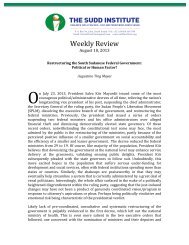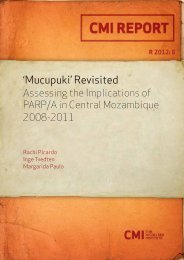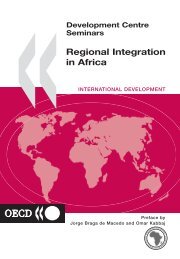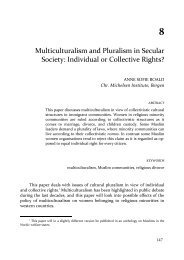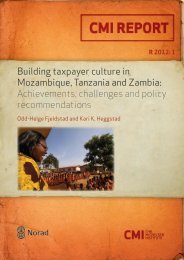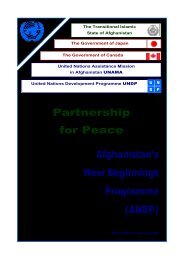Download (pdf) - CMI
Download (pdf) - CMI
Download (pdf) - CMI
You also want an ePaper? Increase the reach of your titles
YUMPU automatically turns print PDFs into web optimized ePapers that Google loves.
<strong>CMI</strong> REPORT DECENTRALISATION AND GENDER R 2008: 9<br />
Administrative representation<br />
- Increased number of female LG staff at professional and management level: Follow up LG<br />
guidelines stating that a qualified woman candidate should be given priority over a male<br />
one.<br />
- Strengthened administrative representation: Networking, capacity building and mentoring<br />
for female professional and management staff in Local Governments<br />
Focus on key women’s interests<br />
- Education: Access to secondary education, retaining of pregnant girls and young mothers in<br />
secondary school<br />
- Economy: Access to formal work, Access to loans and micro credits<br />
- Agriculture: Access to land, loans, tools, fertilizers and seeds<br />
- Health: Give women access to a full range of maternal health services, such as family<br />
planning, health care during pregnancies, skilled care at birth, birth assistance to those who<br />
develop complications – as well as care for sexually transmitted diseases and abortion<br />
complications. Prevention of corruption and bribes in health services<br />
7.3 Cooperation between government structures<br />
The cooperation between district staff and departments varies between districts, departments and<br />
staff members. In all districts the Health Department played a key role, and the coordination with<br />
Department for Planning appear to be good. Cooperation with the Department for Community<br />
Development was less pronounced, apart from one of the districts, where a UNICEF Child Survival<br />
Protection and Development project was carried out. Department for Community Development is<br />
central to enhance participation and include the lower local government levels. These departments<br />
often lack transport and fuel, and therefore have a limited role regarding community mobilisation on<br />
maternal health.<br />
7.4 Coordination between government and civil society<br />
Improving the relations between local governments and civil society has been one of the objectives<br />
of the project – as this cooperation is an important part of D by D.<br />
The project activities have included participation from various NGOs at the meetings and<br />
workshops:<br />
- White Ribbons Alliance<br />
- Women’s Dignity Project<br />
- Tanzania Gender Network Program<br />
- Care<br />
- Health Equity Network<br />
While we see that the cooperation between local governments and civil society organisations seem<br />
to function well in some of the specific Best Practice areas, we doubt whether the project will lead<br />
to sustainable cooperation in this field – at the central as well as the local level. We have observed<br />
lack of confidence and negative attitudes between local governments and NGOs on several<br />
occasions.<br />
There are probably structural problems behind this; partly linked to financial issues. Local<br />
Governments and PMO-RALG do not seem to have funds for civil society participation at meeting<br />
and seminar – only for government representatives.<br />
39



